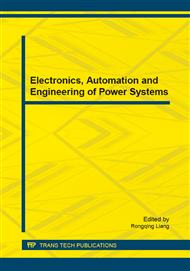[1]
IEC. Electric railway equipment-Train bus-Part 1: Train Communication Network IEC61375-1[S]. (1999).
Google Scholar
[2]
Jiming Chen, Zhi Wang, Youxian Sun, A Basic study on Algorithm of Real-Time Schedule Table for Fieldbus, Proceedings of the 4th World Congress on Intelligent Control and Automation, 2002, 1760-1763.
DOI: 10.1109/wcica.2002.1021384
Google Scholar
[3]
Zhi Wang, Survey of Real-time Schedule Theory and the State-of-the-art of Its Application in Industrial Real-time Communication System(part two), Information and Control, 2002, 31(3): 241-249. (In Chinese).
Google Scholar
[4]
B. Andersson, E. Tovar, The Utilization Bound of Non-preemptive Rate-monotonic Scheduling in Controller Area Networks is 25%, IEEE International Symposium on Industrial Embedded Systems. Lausanne, Switzerland: SIES, 2009, 11-18.
DOI: 10.1109/sies.2009.5196186
Google Scholar
[5]
Wei Pu, Yiren Zou. Study of FF Fieldbus Control System Scheduling Problem, Information and Control, 2002, 31(6): 513-517. (In Chinese).
Google Scholar
[6]
Yueqin Zhu, Weida Xie, Xitong Tan, et al, Real-time scheduling of periodic messages for MVB, Computer Applications, 2007, 27(12): 3108-3111. (In Chinese).
Google Scholar
[7]
Yongxiang Wang, Lide Wang, The Optimization Method of the MVB Period Polling Table, Journal of the China Railway Society, 2009, 31(6): 46-52. (In Chinese).
Google Scholar
[8]
Chaoyong Guo, Jianqiang Liu, Qionglin Zheng, Research on the TCN Network Periodic Polling Optimization Algorithm for the 350km/h Electrical Multiple Units, Journal of the China Railway Society, 2011, 33(12): 46-50. (In Chinese).
Google Scholar
[9]
Lei Chen, Jianxiang Jin, Jian Zhu, Study on Bandwidth Allocation Optimization Strategy of FF Acyclic Communication, Chinese Journal of Scientific Instrument, 2002, 23(4): 395-399. (In Chinese).
Google Scholar
[10]
Jiming Chen, Zhi Wang, Yeqiong Song, et al. Performance Compare with Aperiodic Messages Schedule of WorldFIP and FF, Chinese Journal of Scientific Instrument, 2005, 26(4): 386-390. (In Chinese).
Google Scholar
[11]
F. Vasques, G. Juanole, Pre-run-time schedulability analysis in fieldbus networks, Proceedings of the 20th Annual Conference of the IEEE Industrial Electronics Society, IEEE, 1994, 1200-1204.
DOI: 10.1109/iecon.1994.397963
Google Scholar
[12]
C. Cardeira, Z. Mammerri, A Schedulability Analysis of Tasks and Network Traffic in a Distributed Real-time Systems, Measurement, 1995, 15(1): 71-83.
DOI: 10.1016/0263-2241(94)00039-a
Google Scholar
[13]
L. Almeida, E. Tovar, J. A .G. Fonseca, Schedulability Analysis of Real-Time Traffic in WorldFIP Networks: An Integrated Approach, IEEE Transactions on Industry Electronics, 2002, 49(5): 1165-1174.
DOI: 10.1109/tie.2002.803242
Google Scholar
[14]
P. Pedro and A. Burns, Worst case response time analysis of hard real-time sporadic traffic in FIP networks, Proceedings of the 9th Euromicro Workshop on Real-time Systems, IEEE, 1997, 3-10.
DOI: 10.1109/emwrts.1997.613757
Google Scholar
[15]
E. Tovar, F. Vasques, Contributions to the Worst-Case Response Time Analysis of Real-Time Sporadic Traffic in World-FIP, Procs. of 11th IEEE Europe Conference on Real-Time Systems, 1999, 17-20.
DOI: 10.1109/emwrts.1997.613757
Google Scholar
[16]
Z. Wang, Y. X. Sun, T. R. Wang, Response Time of Aperiodic Message in FF Fieldbus, International Symposium on Distributed Computing and Application to Business, Engineer and Science, 2001, (2): 1901-(1908).
Google Scholar
[17]
E. Tovar, F. Vasques, Distributed computing for the factory-floor: a real-time approach using WorldFIP networks, Computers in Industry, 2001, 11-31.
DOI: 10.1016/s0166-3615(00)00078-6
Google Scholar
[18]
L. Du, G. Q. Xu, Worst Case Response time analysis for CAN messages with offsets, ICVES 2009, 41-45.
DOI: 10.1109/icves.2009.5400204
Google Scholar


